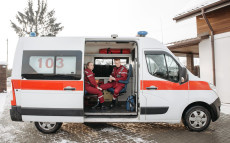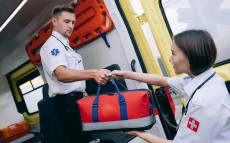- pathfindersAI
- Job Profile
Lifeguards, Ski Patrol, and Other Recreational Protective Service Workers
Summary
Lifeguards, Ski Patrol, and Other Recreational Protective Service Workers
What They Do
In the vibrant and diverse world of recreational activities, Lifeguards, Ski Patrol, and Other Recreational Protective Service Workers serve as the unsung heroes, ensuring the safety and well-being of participants. These dedicated professionals are responsible for overseeing various recreational environments, from bustling swimming pools to serene oceanfront beaches and snow-covered mountains. Their primary mission is to prevent emergencies, respond to accidents, and provide medical attention when needed.
Job Responsibilities
The responsibilities of these protective service workers are vast and crucial. Lifeguards vigilantly monitor aquatic environments, enforce rules, and execute water rescues when patrons are in distress. They are also responsible for maintaining the pool's cleanliness and monitoring weather conditions to ensure a safe recreational atmosphere.
On the snow-blanketed slopes, Ski Patrol members patrol ski areas, mark hazards, and provide first aid to injured skiers and snowboarders. They manage emergency procedures, conduct search and rescue missions, and sometimes assist in avalanche control. Both lifeguards and ski patrollers often participate in regular training and drills to maintain their readiness in any critical situation.
Other Recreational Protective Service Workers, such as park rangers, oversee the safe use of natural parks and recreational areas. They enforce regulations, provide visitor information, and offer emergency rescue services. In each of these roles, vigilance, rapid response, and preventative measures are of paramount importance.
Essential Skills
A career in recreational protective services demands a unique blend of skills and attributes. Strong swimming abilities and physical stamina are essential for lifeguards, coupled with keen observational skills to detect signs of potential danger. For ski patrollers, excellent skiing or snowboarding skills are crucial, along with physical endurance to navigate challenging terrains and manage medical emergencies at high altitudes.
Both lifeguards and ski patrol personnel must possess a thorough understanding of first aid and cardiopulmonary resuscitation (CPR). Effective communication skills are vital for issuing clear instructions and calming individuals in distress. Additionally, problem-solving abilities, quick decision-making, and the capacity to work well under pressure significantly enhance their effectiveness in crisis situations.
Educational Pathways
The educational pathways for Lifeguards, Ski Patrol, and Other Recreational Protective Service Workers vary, but certification is universally required. Aspiring lifeguards typically must complete training in lifeguarding, first aid, and CPR/AED, offered by organizations such as the American Red Cross. Some roles may also require additional training in water park safety or waterfront skills.
Ski Patrol members often obtain certification through the National Ski Patrol (NSP), which includes first aid and toboggan handling skills. Many ski resorts also provide on-the-job training tailored to their specific environment. College courses in recreation management, emergency medical services, and physical education can further bolster an individual's qualifications and career prospects.
Career Prospects
Career prospects in this field remain robust, driven by the ongoing demand for recreational safety. Lifeguards find employment in various settings, including public pools, water parks, beaches, and resorts. Seasonal positions are common, particularly in spring and summer, but year-round opportunities also exist in indoor facilities and tropical locales.
For Ski Patrol members, opportunities abound in winter resorts and ski areas, with seasonal peaks during the ski season. Those with additional skills and training in emergency medical services or avalanche rescue may pursue specialized roles and advance to higher responsibility positions such as patrol director or resort safety manager.
The role of Other Recreational Protective Service Workers, such as park rangers, continues to be essential in preserving and protecting natural and recreational areas. Career advancement in these roles may involve further education and training, leading to supervisory or administrative positions.
Conclusion
In conclusion, Lifeguards, Ski Patrol, and Other Recreational Protective Service Workers play an indispensable role in ensuring the safety and enjoyment of recreational activities. Their unwavering dedication to preventing accidents and providing emergency care is paramount to fostering a secure environment for all. By developing essential skills, obtaining relevant certifications, and pursuing continuous education, individuals in this field not only enhance their career prospects but also contribute to the well-being of their communities. As the demand for recreational safety persists, these professionals stand as guardians of our leisure spaces, embodying both resilience and reliability.
Video
Compensation
| State | Median Salary | Median Hourly | Positions |
|---|---|---|---|
| AL | 22,160 | 10.65 | 710 |
| AK | 35,120 | 16.88 | 290 |
| AZ | 32,320 | 15.54 | 2,680 |
| AR | 25,250 | 12.14 | 450 |
| CA | 37,030 | 17.80 | 13,320 |
| CO | 34,260 | 16.47 | 4,710 |
| CT | 31,080 | 14.94 | 1,340 |
| DE | 24,440 | 11.75 | 290 |
| DC | 55,240 | 26.56 | 360 |
| FL | 33,150 | 15.94 | 9,010 |
| GA | 31,200 | 15.00 | 2,650 |
| HI | 53,330 | 25.64 | 700 |
| ID | 25,650 | 12.33 | 490 |
| IL | 30,580 | 14.70 | 6,920 |
| IN | 25,330 | 12.18 | 2,400 |
| IA | 23,970 | 11.52 | 1,090 |
| KS | 22,210 | 10.68 | 1,330 |
| KY | 26,830 | 12.90 | 1,100 |
| LA | 21,030 | 10.11 | 590 |
| ME | 30,640 | 14.73 | 260 |
| MD | 30,430 | 14.63 | 2,720 |
| MA | 35,190 | 16.92 | 2,550 |
| MI | 28,260 | 13.59 | 2,630 |
| MN | 30,320 | 14.58 | 1,780 |
| MS | 21,840 | 10.50 | 330 |
| MO | 26,260 | 12.63 | 2,550 |
| MT | 27,720 | 13.33 | 410 |
| NE | 23,900 | 11.49 | 720 |
| NV | 29,780 | 14.32 | 2,080 |
| NH | 29,550 | 14.21 | 330 |
| NJ | 31,200 | 15.00 | 3,780 |
| NM | 25,300 | 12.16 | 590 |
| NY | 35,430 | 17.04 | 6,480 |
| NC | 26,710 | 12.84 | 3,830 |
| ND | 28,200 | 13.56 | 590 |
| OH | 24,320 | 11.69 | 5,890 |
| OK | 24,270 | 11.67 | 610 |
| OR | 32,960 | 15.85 | 1,230 |
| PA | 28,290 | 13.60 | 4,670 |
| RI | 33,590 | 16.15 | 110 |
| SC | 26,580 | 12.78 | 1,880 |
| SD | 28,230 | 13.57 | 570 |
| TN | 24,290 | 11.68 | 1,550 |
| TX | 26,300 | 12.64 | 11,210 |
| UT | 24,540 | 11.80 | 1,970 |
| VT | 30,560 | 14.69 | 210 |
| VA | 28,200 | 13.56 | 4,790 |
| WA | 36,250 | 17.43 | 3,010 |
| WV | 22,360 | 10.75 | 370 |
| WI | 27,130 | 13.04 | 2,930 |
| WY | 24,320 | 11.69 | 470 |
Similar Occupations
In this area you will find other occupations that are close to the one you were viewing in tasks, knowledge and work environment. If the primary job profile you are viewing isn't quite to your liking, take a look around and see what else is available.
Basic and Premium Accounts have more alternative occupations available than the Free account.

Ambulance Drivers and Attendants, Except Emergency Medical Technicians - 53-3011.00
Ambulance Drivers and Attendants, Except Emergency Medical Technicians, primarily transport patients to and from healthcare facilities in a non-emergency capacity, ensuring safe and timely arrival. They also assist with patient handling and may provide basic care and comfort during transport.
-
$32,580/yr
Median Pay -
11,520
Number of Jobs

Emergency Medical Technicians - 29-2042.00
Emergency Medical Technicians (EMTs) are first responders trained to provide critical pre-hospital care in medical emergencies, ranging from trauma and cardiac incidents to respiratory distress and more. They assess patients, administer necessary medical interventions, and transport patients to healthcare facilities for further treatment.
-
$38,930/yr
Median Pay -
167,040
Number of Jobs